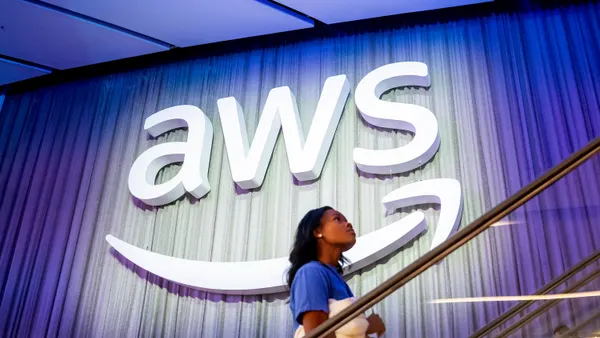IBM's knack for disruptive technologies, like blockchain and cloud-accessible quantum capabilities, has carried it through the years.
Its communication platform, Watson Workspace, is not one of those technologies.
On Wednesday, Big Blue announced its "cloud service withdrawal" for Watson Workspace marketing and "anticipates ending" the service entirely by Feb. 28. Content currently stored on Watson Workspace will expire within a month of its termination though service support will continue through the remainder of its existence.
The company is discontinuing selling Watson Workspace because it hasn't "seen it sufficiently resonate with clients or obtain traction in the marketplace," according to IBM's announcement.
In a increasingly crowded area of technology, IBM was unable court customer interest, focusing on a niche platform rather than fostering broad market appeal. Its strategy left Watson Workspace far behind well-known communication platform brands like Slack and Microsoft Teams.
The quiet player
When IBM's product was announced in October 2016, the same time Workplace by Facebook launched, IBM promised a collaborative solution where employees could communicate and have a single stream of applications. The premise is near identical to the application integration models of other offerings in the communication platform market.
Yet when asked, market experts weren't as familiar with the platform as other incumbents.
"I've never seen a deployment of IBM Watson Workspace in my 12-year career in the collaboration industry," Carrie Basham Young, principal and CEO of Talk Social to Me, told CIO Dive in an email.
"We haven't seen any customer come to the table and say, 'we want something from IBM because it's easy to use,' or 'our employees are clamoring for the latest and greatest from IBM,'" said Basham Young.
Watson Workspace is part of what Gartner calls the Workstream Collaboration market. The firm acknowledges no single vendor dominates the space so it opens the market up for "duality," Mike Gotta, VP analyst for Gartner, told CIO Dive in an email.
The duality is between horizontal vendors that serve more general needs and vendors that are more in tune with specific business use cases or scenarios. IBM was one of the vendors to try to do the latter, according to Gotta. Slack and Microsoft Teams are more horizontally focused.
But the fight right now is serving frontline employees. "So unless you were looking for a Workstream option in those areas, it's not surprising that overall market awareness was not all that universal," said Gotta.
What's Watson Workspace?
Watson Workspace never made a name across workplace communication platforms. The market instead has been dominated by platforms produced by Slack, Microsoft, Google and Facebook.
The space is open to old players and new ones, "adjacent markets that have extended their core applications to offer various levels of collaboration and communications," said Gotta. Success is deeply rooted in partnerships, business development and innovation.
Workplace by Facebook launched more than 50 software as a service integrations in May and Google Chats and Microsoft Teams have intercompany collaboration offerings through G Suite and Azure. In 2017, Slack and Oracle teamed up for Oracle employees to use the tool in Oracle's software.
Microsoft Teams launched less than a year after IBM's platform in 2017 and is now the fastest growing application in the company's history and used by 329,000 organizations.
Microsoft Teams "eclipsed" Yammer, a social networking service for the enterprise, in its pursuit of collaboration whereas IBM was still connected with tools like Connections and Verse, social and analytics-based collaboration platforms, according to Gotta.
Gartner is beginning to shift Teams from the Workstream Collaboration category into an Meeting Solutions application and ad-hoc document collaboration platform due to its integration capabilities with SharePoint and OneDrive.
The door is open for more vendors to differentiate themselves and narrow their general focus. While this was IBM's trajectory, "this is a tough market to gain awareness and presence in," said Gotta.
Sorry, Big Blue
IBM is a well-known tech provider with a history spanning decades. Its technology helped pave the way to the cloud with magnetic tape. But maybe that's where Watson Workspace suffered.
IBM is involved in so many fields and its communication platform didn't rise to the adoption rates set by its competitors.
"IBM has signed an agreement to divest select collaboration software assets as they are increasingly sold by IBM as stand-alone products," according to IBM, in an emailed statement to CIO Dive. The company "continues to prioritize investments in high-value segments of the IT industry. These include AI for business, hybrid cloud, cybersecurity, analytics, supply chain and blockchain as well as industry-specific cognitive platforms and solutions including healthcare, industrial IoT, and financial services."
Big Blue is not the only company dropping out of the market in the last year.
In July, Atlassian announced Slack was acquiring the its intellectual property of its chat tools, HipChat and Stride. For Atlassian, the offerings were no longer worth the investment needed to compete in a market that wasn't producing the same return as other products in its suite.
It seems like Watson Workspace was a "Band-Aid on a gaping collaboration wound, and now they've realized it's time to visit the doctor," said Basham Young.
"Microsoft, Workplace by Facebook and Slack have realized this and they're executing on the promise of creating value for the rank and file teams," said Basham Young. IBM and VMware also have struggled to effectively capitalize on peer communication.






















